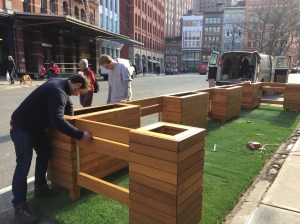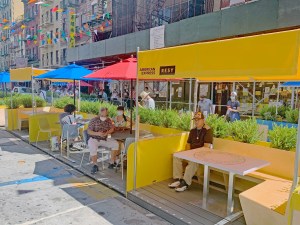Pop-Up Café Expansion Faces Critical Community Board Vote Tonight

When DOT installed its first “pop-up café” over a few parking spaces on Lower Manhattan’s Pearl Street last summer, the 14-table public seating area helped increase business by 14 percent at its two sponsoring restaurants. With New York City still recovering from recession and much of the city starved for public space, DOT has moved to expand the program. Restaurants were given the option of requesting a café and DOT selected twelve locations from that pool of applicants. The selected locations are concentrated in the Village and SoHo, making tonight’s Community Board 2 vote a critical moment for the program.
The pop-up café program is an import from San Francisco, where what they call “parklets” have replaced parking spaces with seating across the city. In New York’s program, the cafés are paid for by nearby restaurants looking for more nearby seating and greater visibility, though the seating is open to all and restaurants aren’t allowed to provide table service to the café. The cafés are only allowed in neighborhoods where there isn’t space for regular sidewalk cafés.
The basic premise is that in these neighborhoods, the balance between space for people and space for storing cars is out of whack; businesses will do better with more seating than with more parking.
DOT has decided to give community boards the total power to veto any pop-up café, according to the Downtown Express, which has editorialized in support of the program. Since more than half of the proposed locations are in the Village or SoHo, tonight’s vote by Community Board 2 will largely determine the shape of the project citywide.
Though CB 2’s transportation committee approved six out of the seven proposed applications in the area, tonight’s full board vote is expected to be more contentious. Sean Sweeney, co-chair of the board’s landmarks committee, strongly opposes the pop-up café concept, telling the Express, “It’s a commercial use incompatible with residential use.” Sweeney has a habit of using his organization, the Soho Alliance, to oppose any change in the neighborhood, including bike lanes and car-free streets.
The full board will vote tonight after allowing public testimony on this and other issues. Show up at 6:00 p.m. tonight at SEIU Local 32BJ’s offices, 101 Avenue of the Americas, 22nd Floor, to let the board know that you think supporting local businesses and creating public space is more important than a few parking spaces in this largely car-free neighborhood.

